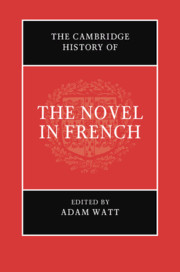Book contents
- The Cambridge History of the Novel in French
- The Cambridge History of the Novel in French
- Copyright page
- Contents
- Figures
- Contributors
- Acknowledgements
- Note on Conventions
- Chronology
- Introduction
- Part I Beginnings: From the Late Medieval to Madame de Lafayette
- Part II The Eighteenth Century: Learning, Letters, Libertinage
- Part III After the Revolution: The Novel in the Long Nineteenth Century
- Part IV From Naturalism to the Nouveau Roman
- Part V Fictions of the Fifth Republic: From de Gaulle to the Internet Age
- 30 Oulipo, Experiment and the Novel
- 31 Theories of the Novel
- 32 The Caribbean Novel in French, 1958–2016
- 33 The North African Novel in French
- 34 Sub-Saharan Africa and the Novel in French
- 35 The Translingual Novel in French
- 36 Literary Prizes
- 37 Autofiction: Writing Lives
- 38 Trends in the Novel in French after 2000
- 39 Contemporary Women’s Writing in French
- 40 The Novel in French and the Internet
- Index
- References
38 - Trends in the Novel in French after 2000
from Part V - Fictions of the Fifth Republic: From de Gaulle to the Internet Age
Published online by Cambridge University Press: 04 February 2021
- The Cambridge History of the Novel in French
- The Cambridge History of the Novel in French
- Copyright page
- Contents
- Figures
- Contributors
- Acknowledgements
- Note on Conventions
- Chronology
- Introduction
- Part I Beginnings: From the Late Medieval to Madame de Lafayette
- Part II The Eighteenth Century: Learning, Letters, Libertinage
- Part III After the Revolution: The Novel in the Long Nineteenth Century
- Part IV From Naturalism to the Nouveau Roman
- Part V Fictions of the Fifth Republic: From de Gaulle to the Internet Age
- 30 Oulipo, Experiment and the Novel
- 31 Theories of the Novel
- 32 The Caribbean Novel in French, 1958–2016
- 33 The North African Novel in French
- 34 Sub-Saharan Africa and the Novel in French
- 35 The Translingual Novel in French
- 36 Literary Prizes
- 37 Autofiction: Writing Lives
- 38 Trends in the Novel in French after 2000
- 39 Contemporary Women’s Writing in French
- 40 The Novel in French and the Internet
- Index
- References
Summary
This chapter identifies and analyses some of the major trends of the millennial novel in French from the huge and diverse corpus on offer: ‘reality, not realism’, ‘history, but for the present’, ‘fantasy and the ludic’, ‘language, but not for language’s sake’. The titles signal how these millennial versions of trends recognisable from past centuries have taken on nuances that clearly distinguish them from their predecessors. The millennial ‘realist’ novel stages authentic, non-fictional voices within a fictional frame, using the fictional as a means of investigation into reality; the millennial historical novel takes a présentiste (Hartog) approach to history, often using the present tense to bring even the distant past into the realm of the present. The millennial version of the fantastical and ludic novel benefits from the readers’ greater awareness of the novel as a created object, an awareness which is also exploited by writers of more popular literature. So too do the novelists who experiment with language, producing works that depend on the reader’s acceptance of it as belonging to a fictional universe. The chapter concludes that a readership trained in the art of novel-reading is vital to the success of all of these trends.
Keywords
- Type
- Chapter
- Information
- The Cambridge History of the Novel in French , pp. 688 - 705Publisher: Cambridge University PressPrint publication year: 2021

